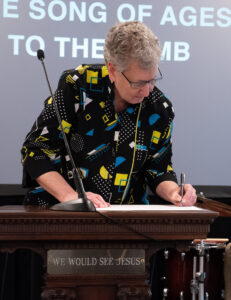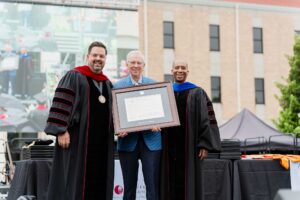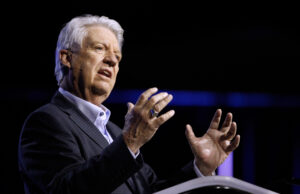
 East Paris Baptist Church, through sacrificial missions giving, has experienced God's faithfulness.
East Paris Baptist Church, through sacrificial missions giving, has experienced God's faithfulness.
The Paris, Texas, church began as an independent Baptist congregation in 1942 but affiliated with the SBC a few years later. Under the watch of Mike Fortenberry, the church's pastor since 1979, it has been a regular contributor to the CP and to state missions endeavors.
In 2003, the Paris congregation channeled $48,000 through the Southern Baptists of Texas Convention (SBTC) for CP Missions.
"The Cooperative Program gives us an opportunity, whether our church is large or small, to join together all our resources to do a better job than any of us could do alone," Fortenberry said.
"One of the things that our people have learned about giving to missions and the Cooperative Program is that you cannot out-give God," Fortenberry said. "We have a great opportunity to make a difference through the Cooperative Program."
When the church is faithful toward biblical causes, God is faithful to provide the needs of the congregation, Fortenberry said, sharing a recent testimony of sacrificial giving from his own congregation.
"When we became a part of the SBTC [in 2000], our church leadership felt very strongly that what the state convention was seeking to do would be pleasing to the Lord and not only help us locally but in our state to continue to expand our national and international missions effort," Fortenberry said.
Because the church was growing, land had been purchased for future expansion, with offerings on the fourth Sunday of each month being set aside to pay for the property. However, as a step to strengthen its commitment to missions, although not desiring to have long-term debt, the church voted to send the fourth Sunday offering to the SBTC state missions offering.
"They were wholeheartedly supportive of it and said the Lord will pay off the land," the pastor said. "The Lord is faithful to bless us when we keep missions at the forefront."
Two days later, a friend whom Fortenberry had not seen in ten years came to the pastor's study for a visit. "He pulled out a bank envelope and handed it to me sealed and he said, 'I appreciate your church and its ministry, and I want to have a little part in it.'"
Fortenberry laid it on his desk and continued to visit with his friend. A few hours later, the pastor remembered the gift and opened the envelope; inside was enough money to pay off the property.
"I called him, and I said, 'Are you sure?' He said he had been saving the money and shared that he wanted the Lord's work to be blessed through the gift," the pastor recounted. "I was able to report to the church the next Sunday that we were able to pay off the land and that we were able to sponsor a mission trip. I was able to say to them if we're faithful to God and to obey his commandment in the Great Commission, the Lord will bless us, if not monetarily, in other ways."
Fortenberry said the Lord's lesson of provision has instilled in church members a commitment to put missions first in their lives.
"Our church missions giving has continued to increase," he said, "because they've seen the faithfulness of the Lord."
Although he is an advocate of the SBC's cooperative giving method, Fortenberry was not always a Southern Baptist. Raised and trained in independent Baptist churches and schools, Fortenberry's first Southern Baptist church membership has been at East Paris.
After being exposed to the methodology of the SBC for national and international mission work through his Southern Baptist wife, Gency, Fortenberry accepted a call to East Paris. Since that time, Fortenberry said he has tried to instill in church members the importance of consistent and cooperative missions work.
While many churches share Fortenberry's commitment to cooperative work in missions endeavors, SBC officials have warned of a looming financial crisis in missions outreach unless giving increases nationwide.
The SBC Executive Committee reported last October that Southern Baptists began sending less to CP Missions each year beginning in the 1980s. The average CP designation among churches fell from 10.5 percent of budget to 7.39 percent in 2001-02. Additionally, giving by church members as a percentage of income has declined steadily in the last thirty years and stands at 2.03 percent — far below the biblical standard of the tithe (10 percent), the SBC reported.
At a time when unprecedented numbers of missionary candidates seek appointment with the International Mission Board, the gradual decrease in giving has "led to the delay in the deployment of missionaries, a layoff of employees, and an increase in seminary tuition," the SBC report noted.
Fortenberry said a renewed interest in educating the next generation of Southern Baptists about the CP is crucial to ensure completion of the Great Commission.
"As our mature adults graduate to leave us, our income will dwindle unless there is a change in our children in the years to come," Fortenberry said, noting that most offering funds come from adults age 55 and up. "We must instill God's plan of economics through our teaching, preaching, and personal testimonies."
















